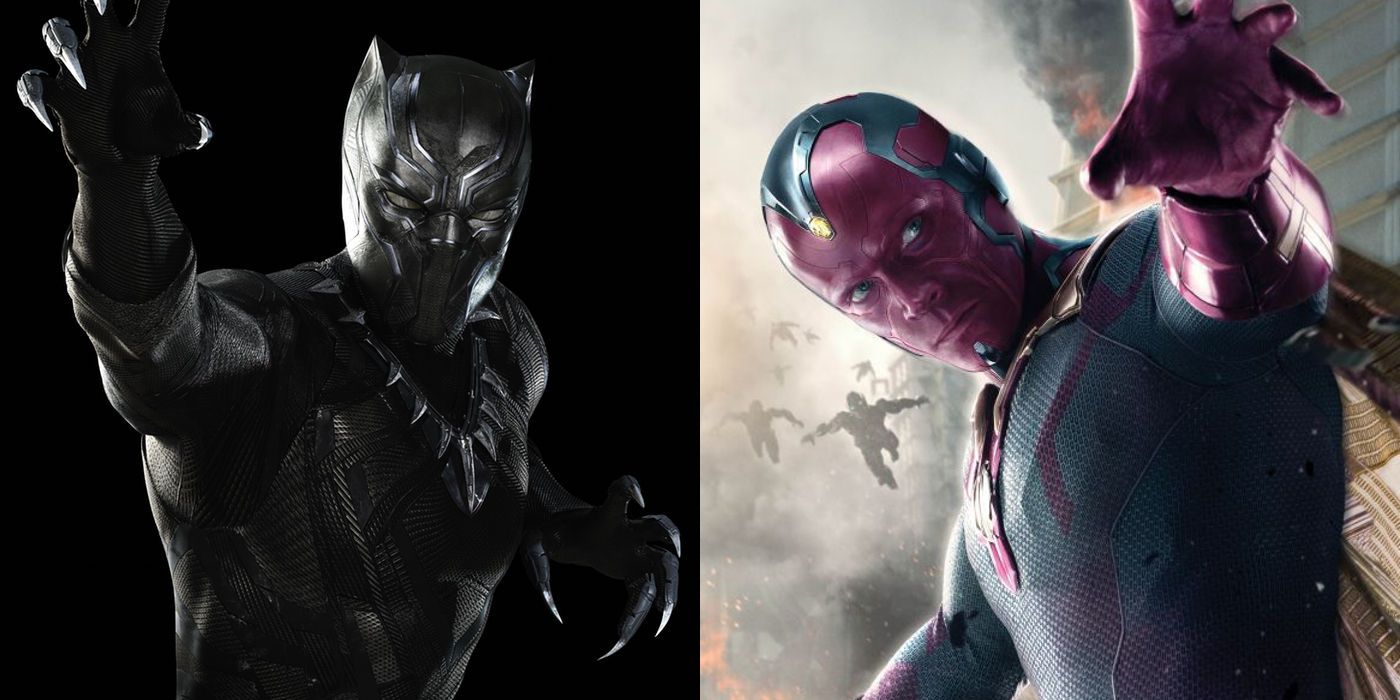Paul Bettany returns to the Marvel Cinematic Universe in Captain America: Civil War for his second turn as Vision, after the character made his much-acclaimed debut in Avengers: Age of Ultron. After years as the voice of J.A.R.V.I.S., Bettany donned the full Vision gear for his first outing and does it again in this one, although the synthetic being is also jarringly and amusingly seen trying to fit in by wearing a sweater and slacks.
There’s nothing jarring about Chadwick Boseman’s debut in the MCU as T’Challa, the Wakandan prince (later king) who becomes the Black Panther. From his initial moment in “normal” clothes to his spectacular first full scene in costume, Boseman fully inhabits the character and seems ready to take his place among other perfect Marvel casting coups like Robert Downey Jr. as Tony Stark, Chris Evans as Steve Rogers and Mark Ruffalo as Bruce Banner.
We spoke with both men at the recent Civil War press junket about Vision’s exploration of humanity and the first time Boseman was told he was going to play the Panther…which was years before Marvel hired him.
Paul, did you petition for Vision to wear street clothes in this film so that you didn’t have to wear the entire costume all the time?
Paul Bettany: (Laughs) The funny thing is that you have to wear it underneath anyway, so that didn’t work out well for me. But we were talking about what Vision might be doing in this movie, and I think it’s a logical progression for him to be, having been sort of – you know, he’s born in the last movie, and is naïve and omnipotent at the same time, and that’s interesting, and where is he gonna go, and I think he’s trying to understand what being human is, and what that’s like, and he’s narrowing it down to this peculiar thing humans have called love, because love gives you loyalty. Logic doesn’t afford you loyalty necessarily. You know, if new information comes to light, I might flip to the other side. Love gives you loyalty. So I think he’s trying to figure that out, and I think that’s gonna be really important as the movies continue.
Chadwick, you have a spectacular entrance as Black Panther in this movie. How much of the character’s history did you know before you signed on – he’s one of the important characters in comic book history.
Chadwick Boseman: I was familiar with the character, you know…I probably wasn’t introduced to the character until college. They didn’t have comic book stores with Black Panther comics in South Carolina, that I remember. But a year before, maybe a year and a half before, there was someone who gave me a comic book, the Black Panther comic book, the first issue, and was like, “You’re gonna play this character.” And they just somehow had that premonition. So at that point, I continued with my study of it loosely, not like I was studying for the role but just like, “Oh, let me read this one, let me read one of Hudlin’s, let me read some other ones, let me go back and watch the animated series,” you know.
So I was aware of the mythology, pretty aware of it, and when I had the first conversation with the Russos and with (Kevin) Feige, I was abreast of the character in a way where they would be like, “Oh, okay, he knows this, he gets it.” Now, once I got the role, there’s a whole different level of exploration, but I was definitely aware of it.
What would you say is the overall theme of this movie? The last one was about the surveillance state, what would you say this one touches on?
Bettany: I think one of the successes of the franchise is that the movies get more and more complex, both in the interpersonal relationships between the superheroes, but also the subject matter that the films are touching on that are reflective of the world in which we’re living. And one of them that’s very obvious in this is about unilateral intervention by a really powerful force and how regulated that should be. And I think it’s amazing in a movie that’s this broad of a church, you know – lots of different types of people come to see these movies – that it’s able to talk about something that’s quite, that needs some sophisticated thinking.
Boseman: I think the movies being topical is definitely a key. I think one of the things that superhero movies in general do, and this movie does, it references mythology in a way. Greek mythology, Egyptian mythology, Roman mythology. So I think once you start to do that and you see gods on different sides, you see they all – you know, we have a sports team and those teams, when they go out and play, they pray. But if they’re both praying, whose side are they on? Whose side is God on? So you’re seeing this dynamic of people having powers, having abilities, and then you’re checking their morality to see if they can wield that power in a way that’s beneficial to more people than just themselves. Like that idea is, you know, in a superhero movie it’s fun to watch that debate and inner struggle amongst the characters.
NEXT: Anthony Mackie and Sebastian Stan Interview for Captain America: Civil War
Captain America: Civil War will release on May 6, 2016, followed by Doctor Strange– November 4, 2016;Guardians of the Galaxy 2 – May 5, 2017;Spider-Man: Homecoming – July 7, 2017; Thor: Ragnarok –November 3, 2017; Black Panther – February 16, 2018; The Avengers: Infinity War Part 1 –May 4, 2018; Ant-Man and the Wasp – July 6, 2018; Captain Marvel – March 8, 2019; The Avengers: Infinity War Part 2 – May 3, 2019; Inhumans –July 12, 2019; and as-yet untitled Marvel movies on May 1, July 10 and November 6, 2020.

